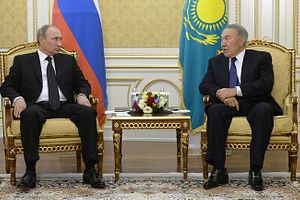As 2014 begins to wind to a close, it seems worth taking stock of the remarkable shift in relations, realities, and potentialities between Russia and Central Asia. Most especially, where Russia was heretofore seen as the regional, post-colonial hegemon in the region, the reality is becoming clear –commensurate with the collapsed ruble and the Russian penchant for interventionism – that the region’s future increasingly lies with China.
This shift seems all but cemented following the spectacular events and spurious policies of 2014. And this shift – this break – can be seen perhaps most notable in relations between Russia and Kazakhstan. At this point, it’s little surprise to note that Russian-Kazakhstani relations have reached a post-Soviet nadir, strained even more than when ethnic Russians attempted to set up an autonomous region in Kazakhstan’s northern stretches during the late 1990s. The reasons for this current strain are myriad. Russian President Vladimir Putin has co-opted Kazakhstani President Nursultan Nazarbayev’s notion of a Eurasian Economic Union (EEU), plastering a veneer of equitability over a neo-imperialist project. The EEU’s construct had already battered the Kazakhstani economy, swamping local businesses and hampering Kazakhstan’s accession to the World Trade Organization. These realities were made all the starker after sanctions began denting Kazakhstan’s projected growth.
Moreover, as the ruble sprints toward collapse, a further devaluation of Kazakhstan’s tenge seems all but assured. The tenge already experienced a 19-percent drop in early 2014, leaving a distinct stain on domestic confidence. Coupled with the disintegrating price of oil – and the decade-long delay of Kazakhstan’s massive Kashagan field – Astana’s economic outlook, blighted through its Russian relations, drops that much further. All told, Kazakhstan’s trade with Russia and Belarus – the two other founding members of the forthcoming Eurasian Union – has sunk nearly 20 percent this year, and shows no sign of recovery as Russia flops into recession. Coming on the back of Kazakhstan’s 20-percent increase in trade turnover with China, Russia’s position as Astana’s preferred partner slags that much further.
And then there’s the ethnic reality, and the ethnic, interventionist models Putin engendered in 2014. Many of the arguments and narratives the Kremlin utilized in Ukraine remain applicable to Kazakhstan, whether it is the fabrication of looming fascism or the threat to Russian populations abroad. To be sure, ethnic Russians in Kazakhstan continue to face instances of both linguistic and employment discrimination, especially as it pertains to governmental positions. But the concept of an “ethnic Kazakh nationalism” remains far from a threat sufficient for foreign interventionism. Nonetheless, in late August, Putin took a swipe at Kazakhstan’s statehood, noting that ethnic Kazakhs had never enjoyed statehood until the end of the Soviet Union. In response, Nazarbayev announced the forthcoming celebration of the 550th anniversary of the founding of Kazakh statehood. The strain arose once again earlier this month, when Nazarbayev called on Kazakhs – not Kazakhstanis, but Kazakhs – to “to choose defending Kazakhstan to the last drop of blood.”
That’s not to say some form of armed incursion, or material and materiel support for ethnic Russian secessionist groups, looms. But the concept of such support can no longer be dismissed out of hand. This stands as one of the starkest results of Russia’s actions in 2014. If foreign, irredentist adventurism remains one of the few tools available to satiate a Russian domestic audience watching its economic contract dissolve, and if Moscow’s further intervention in those post-Soviet nations leaning toward Brussels – Moldova, Georgia, Ukraine – remains tabled for fear of extended sanctions, Kazakhstan stands as one of the few viable options for a Kremlin regime rapidly running out of cards to play.
Of course, there are still numerous steps to take before we see a repetition of Ukraine in, say, Pavlodar or Petropavlovsk. So long as Nazarbayev remains cogent, this likelihood stands close to nil. Such was the rational when former U.S. Ambassador to Russia Michael McFaul brought up the concept of potential “war” with Kazakhstan. McFaul later told me he was “rejecting the idea [of war] completely.” But the mere fact that such a concept could be brought up in logical discourse illustrates how remarkably relations have waned between Astana and Moscow.
Kazakhstan has long been one of Russia’s closest partners, both economically and geopolitically. And in certain rhetorical ventures – photo-ops for the Eurasian Union’s unveiling; discussions at the United Nations – it will likely continue to do so. But just beyond those superficialities, relations have soured to a greater extent than any seen since the Soviet Union’s collapse. As Putin’s recent press conference illustrated, the Kremlin’s political and policy choices driving this strain won’t change anytime soon – meaning 2015 will likely accelerate the pressures this once-tight relationship now knows.

































